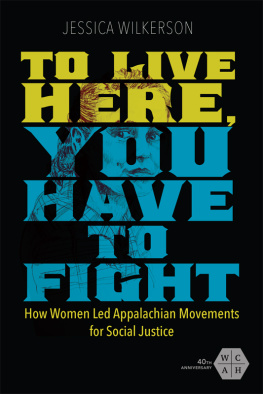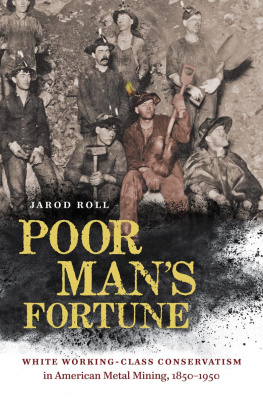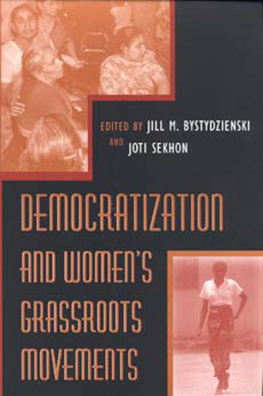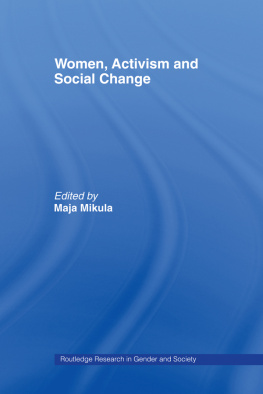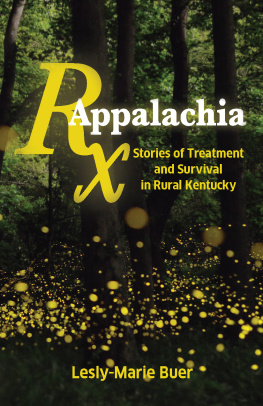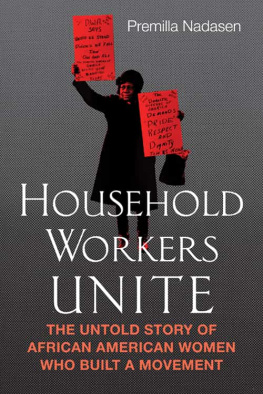To Live Here, You Have to Fight
THE WORKING CLASS IN AMERICAN HISTORY
Editorial Advisors
James R. Barrett, Julie Greene, William P. Jones, Alice Kessler-Harris, and Nelson Lichtenstein
A list of books in the series appears at the end of this book.
To Live Here,
You Have to Fight
How Women Led
Appalachian Movements
for Social Justice
JESSICA WILKERSON
Publication supported by a grant from the Howard D.
and Marjorie I. Brooks Fund for Progressive Thought.
2019 by the Board of Trustees
of the University of Illinois
All rights reserved
Library of Congress Cataloging-in-Publication Data
Names: Wilkerson, Jessica, 1981 author.
Title: To live here, you have to fight: how women led Appalachian movements for social justice / Jessica Wilkerson.
Description: [Urbana, IL: University of Illinois Press, 2019] | Series: The working class in American history | Includes bibliographical references and index.
Identifiers: LCCN 2018032364| ISBN 9780252042188 (cloth : alk. paper) | ISBN 9780252083907 (pbk. : alk. paper)
Subjects: LCSH : WomenPolitical activityAppalachian Region, Southern. | Social actionAppalachian Region, Southern. | Appalachian Region, SouthernSocial conditions20th century.
Classification: LCC HQ 1236.5. A 6 . W 55 2019 | DDC 320.082/0975dc23 LC record available at https://lccn.loc.gov/2018032364
Ebook ISBN 978-0-252-05092-3
Cover illustration by Katie Ries
Pray for the dead, and fight like hell for the living.
Mary Harris Mother Jones
To stay here, youre going to have to fight like hell.
Bessie Smith Gayheart
Contents
Acknowledgments
This book is the culmination of many peoples stories. I am grateful to those who shared their own stories, preserved stories, wrote other peoples stories, and supported my story.
My grandmother Fay Loy Spitzer gave me my first lessons on Appalachian and labor history. She also gave me my first books, took me to the library and museums, and sent me newspaper clippings when I was away at college. The day that I delivered my masters thesis to her she wept. I understood then how truly fortunate I was that I got to do what I loved, and that so many women before me had grieved those lost opportunities even as they celebrated for their daughters and granddaughters.
This book would not be possible without the generosity of people who shared their life histories in interviews. From the moment I met Sue Ella Kobak in 2010, she supported this project. I am grateful to her for sharing her vast knowledge of place, her deep love of Appalachian history, and her commitment to justice and fairness. The day she took me on a tour of Poor Bottom is one of my most memorable research trips and invigorated me as I headed into final writing stages. Many others invited me to their homes and offices, told stories, and shared sources. Special thanks to Eula Hall, the staff at the Eula Hall Health Center, Helen Matthews Lewis, Loyal Jones, Sally Ward Maggard, Helen Rentch, John Rosenberg, Maxine Kenny, Steve Brooks, Jeanette Knowles, Mildred Shackleford, Thelma Witt, June Rostan, and the many others who sat for interviews or spoke with me informally.
I am deeply indebted to the professors who taught me when I was an undergraduate at Carson Newman College. Jeff Daniel Marion introduced me to the poetry of the Appalachian South. Beth Van Landingham, Susan Underwood, Andrew Hazucha, and John Wells cheered my budding interest in womens and gender history and encouraged me to attend graduate school, pointing me in the direction of Sarah Lawrence College. There, Priscilla Murolo demonstrated how to be a scholar. She also introduced me to labor and working-class history and reassured me that there was a place for me in academia if I wanted it. Many thanks to Mary Dillard for introducing me to the method of oral history, and to Komozi Woodard, Lyde Sizer, Tara James, Abby Lester, and the womens history class of 2006 for their support. Sarah Lawrence also gave me my forever-friend Sonia Arora. Thanks, Sonia, for your unyielding friendship.
I am grateful for the people and vibrant intellectual communities that I encountered in Chapel Hill. Jacquelyn Hall, in her bones, understood the value of my research. Her excitement for historical research is contagious, and her commitment to her students admirable. She fosters community like nobody I know. My scholarship, indeed my life, is enriched because of her. Thanks also to Jim Leloudis, Zaragosa Vargas, Nancy MacLean, and, especially, Laura F. Edwards, for their encouragement and advice. For friendship and collegiality, thanks to my sister-scholar Joey Fink, as well as Jennifer Donnally, Sarah McNamara, Nora Doyle, Rachel Hynson, Brad Proctor, Joshua Lynn, and David Williard. My writing group extraordinaireAnna Krome-Lukens, Liz Lundeen, and Shannon Eaveshas made this a better book. Their support and friendship mean the world to me. My only regret is that we dont get to live in the same town and work at the same place for the rest of our lives. The Working Group in Feminism and History was a vital space. So was UNCs Southern Oral History Program (SOHP) and the Center for the Study of the American South. The SOHP in particular had a profound impact on how I think of myself as a scholar in the world, and its influence is etched into this manuscript. Thanks to David Cline, Beth Millwood, Seth Kotch, Della Pollock, Rachel Seidman, Malinda Maynor Lowery, Bill Ferris, Jaycie Vos, and my fellow research assistants there.
This book is possible due to the work of archivists, oral historians, and documentarians. Special thanks to archivists and staff at Appalshop, the Southern Appalachian Archives at Berea College, the Appalachian Center at the Southeast Kentucky Community and Technical College, Wilson Library at UNC, the Louie B. Nunn Center for Oral History at the University of Kentucky, the State Historical Society of Wisconsin, the Archives of Appalachia at East Tennessee State University, the Lyndon Baines Johnson Library, and the Schlesinger Library at Harvard. I am grateful to the interviewers who recorded and archived oral history interviews with men and women who lived, worked, and fought for a better world in eastern Kentucky. I had help imagining the historical period of which I wrote thanks to the filmmakers Elizabeth Barrett, Barbara Kopple, Anne Lewis, Mimi Pickering, and Lucy Massie Phenix; documentarians Guy and Candie Carawan; and photographers Phil Primack and Earl Dotter.
I am grateful to Jacquelyn Hall for meticulously reading the manuscript at various stages. For reading all or parts of the manuscript, thanks to Ted Ownby, Sue Ella Kobak, Shennette Garrett-Scott, Sue Grayzel, Ken Fones-Wolf, Daniel Horowitz, Barbara Ellen Smith, Sally Ward Maggard, Melissa Estes Blair, Megan Black, Katherine Turk, Elizabeth Payne, Sarah McNamara, Shannon Eaves, Anna Krome-Lukens, Liz Lundeen, Melody Ivins, and members of the Delta Women Writers Symposium. I owe a special debt to Katherine Mellon Charron for helping me find my way to a title. Portions of chapter six appeared previously in The Company Owns the Mine But They Dont Own Us: Feminist Critiques of Capitalism in the Coalfields of Kentucky in the 1970s, in Gender & History 28, no. 1 (April 2016), and I would like to thank the editors of Gender & History and anonymous readers for their helpful feedback.
Thanks to James Engelhardt and the staff at the University of Illinois Press, especially Alison K. Syring, for shepherding me through the publishing process. Thanks also to Susan Youngblood Ashmore and Julie Greene for their careful reading of the manuscript and incisive feedback in the late stages of writing.

